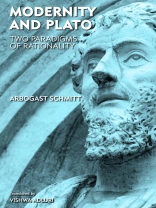Sets itself the Herculean task of comparing and reconciling the modern and Platonic concepts of rationality.
Modernity’s break with the Middle Ages is distinguished by a comprehensive turn to a world of individual, empirical experience, a turn that was a repudiation of Plato’s idea that there is a reality of rationality and intellect. Yet already in the Renaissance it was no longer thought necessary to seriously confront the ‘old’ concept of rationality that emanates from Plato. Arbogast Schmitt’s book sets itself this until-now-unfulfilled task, comparing the arguments for a life based on theory and one based on praxis in order to provide a balance sheet of profit and loss. Showing that the Enlightenment did not, as often assumed, discover rationality, but instead a different
concept of rationality, the book opens one’s view to other forms of rationality and new possibilities of reconciliation with one’s own – that is, Western – history.
Modernity and Plato was hailed upon its publication in Germany (2003, revised 2008) as ‘one of the most important philosophy books of the past few years, ‘ as ‘a book that belongs, without any doubt, in the great tradition of German philosophy, ‘ and as ‘a provocative thesis on the antiquity-modernity debate.’ It is a major contribution to synthetic philosophy and philosophical historiography, in English for the first time.
Arbogast Schmitt is Honorary Professor at the Institute for Greek and Latin Philology at Free University, Berlin and Emeritus Professor of Classical Philology and Greek at the University of Marburg, Germany. Vishwa Adluri teaches in the Departments of Religion and Philosophy at Hunter College, City Universityof New York.
قائمة المحتويات
Introduction
Do Freedom and Indeterminacy Make Man a Cultural Being? Or, Why Antiquity Seems Antiquated
‘Healthy Common Sense’ and the Nature/Culture Antithesis
The Interpretation of ‘Antiquity’ from the Perspective of Modern Rationality
The Epistemological Foundations of a Philosophy of Discrimination
Abstract Consciousness versus Concrete Thought: Overcoming the Opposition between Feeling and Reason in a Philosophy of Discrimination
The Soul in a Philosophy of Consciousness and in a Philosophy of Discrimination
The Different Forms of Volition and Their Dependence upon Cognition
The Aesthetic, Ethical, and Political Significance of a Culture of Feelings in Plato and Aristotle
Theory and Practice: Plato’s and Aristotle’s Grounding of Political Theory in a Theory of Man
Evolutionary and Biological Conditions for Self-Preservation and Rational Conditions for Man’s Self-Realization: An Appeal for a New Evaluation of Rationality
The Contrast ‘Ancient’ versus ‘Modern’
Characteristic Differences between the Platonic-Aristotelian and the Hellenistic Understanding of Rationality
Index












